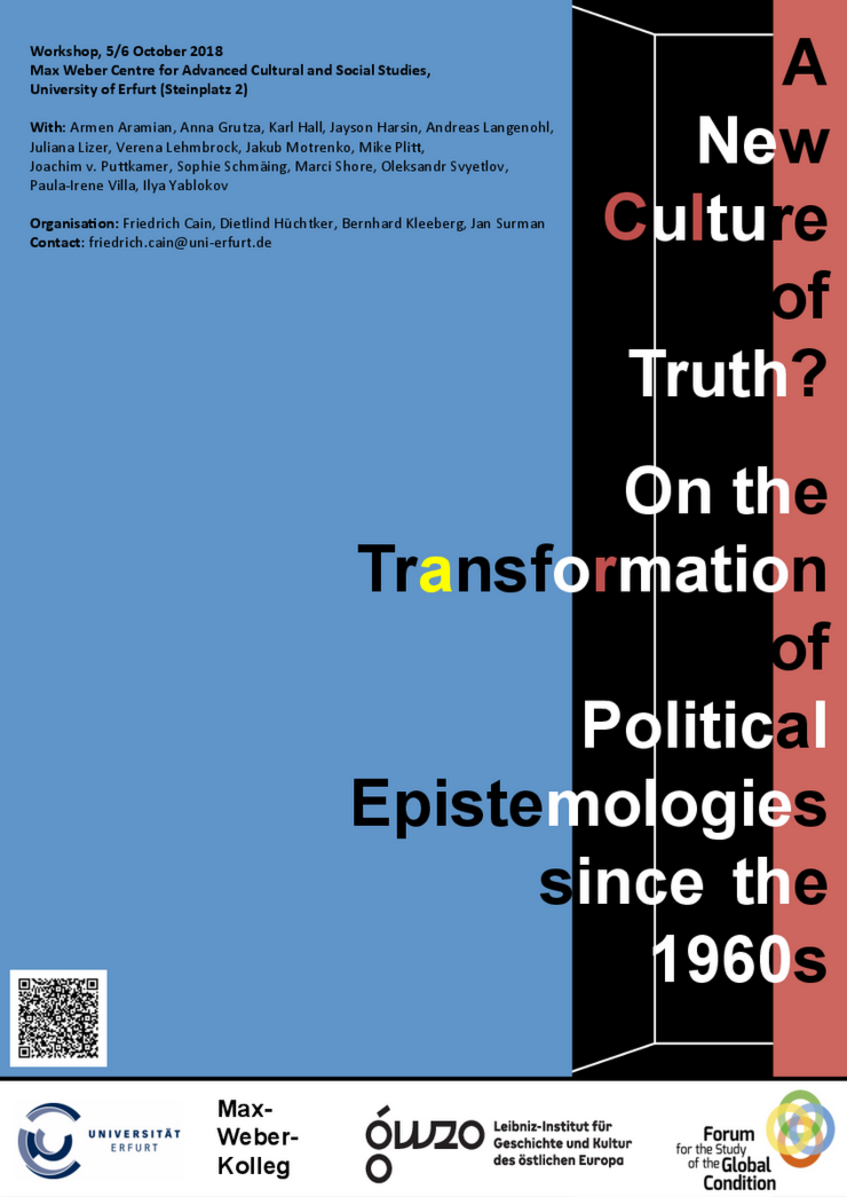
A New Culture of Truth? On the Transformation of Political Epistemologies since the 1960s
Erfurt, 5-6 October 2018
Venue: Max-Weber Centre/University of Erfurt
Organisers: Friedrich Cain, Dietlind Hüchtker, Bernhard Kleeberg, Jan Surman
Funded by: Forum for the Study of the Global Condition /// Max Weber Center for Advanced Cultural and Social Studies, University of Erfurt
Contact: Friedrich Cain
2017 saw the alleged rising of a “post-truth era,” closely associated with a destabilisation of familiar epistemologies and the dismissal of their classical gate keepers. New political epistemologies have emerged that follow the truth regimes of specific group attitudes – often nationalist, chauvinist, xenophobic – and are spread via both new and traditional media, such as Facebook and Twitter, television and newspapers, emitted by private, semi-official, and even governmental brokers.
The deliberate use of ‘versions’ of truth has become very influential, as political parties promoting them have begun restructure media landscapes or promote new politics of memory etc. Consequences have become manifest in nation states, international organizations and unions: for a long time, consensus building stemmed from the integration of different interests on basis of the same epistemological values (truthfulness, trust etc.) and categories (facts, objectivity etc.), that are now being questioned. Classical ‘truth figures’ like the scientist, the journalist, or the dissident have been joined by bloggers, spin-doctors, or debunkers who dwell in places that seem to have emerged only recently, and especially with the establishment of Web2.0.
Though “fake news” and “alternative facts” have predominantly been discussed with reference to the US, the workshop’s main focus will be on the former Warsaw Pact countries, where the negotiation of truth has a specific history: After 1989, Marxism lost its monopoly of interpretation to other – often “Western” – truth regimes. Dissidents and social movements, who had emphatically (re-) claimed ‘truth’ as a weapon against their regimes before 1989, have smaller impact today, due to the digital atomization of perspectives.
These shifts in epistemological landscapes cannot be observed and described easily along the well-known lines of propaganda, information and disinformation etc. Following a praxeological approach to truth (Kleeberg/Suter 2014) the aim of the workshop was to systematically assess these changes. We therefore examined the practical contexts in which truth claims are embedded, the (trans-)formation or (de-)stabilization of “truth scenes” (e.g. the trial) and “truth figures”. We took a closer look at the shift(s) of truth regimes from the heyday of the Cold War in the 1960s until today. We paid special attention to the transformation of medial settings of information flows and the processes of forming public opinion, which were being set into relation with the entangled history of political epistemologies of (Eastern) Europe. Of course, these phenomena cannot only be spotted in the US and post-Soviet spaces. Therefore, we were very much interested in comparative case studies from other global regions without specific post-Soviet experiences.
Bibliography
Kleeberg, Bernhard / Robert Suter, “Doing Truth. Bausteine einer Praxeologie der Wahrheit”, in: Wahrheit. Zeitschrift für Kulturphilosophie 8 (2014/2), 211-226.
